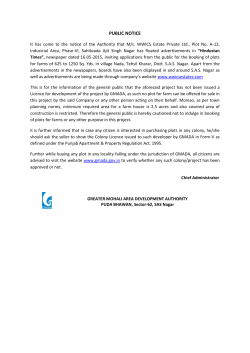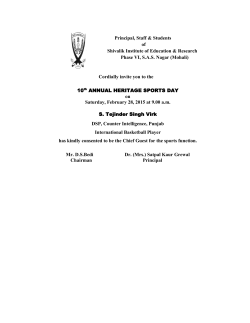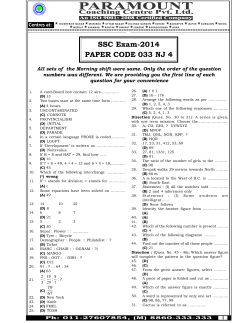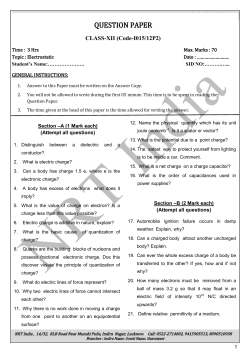
Research - SANNIHITA
SANNIHITA CENTER FOR WOMEN AND GIRL CHILDREN SOCIETY Regd No. 1653/2000 Add for corres : F-89, RBI Staff Quarters, Musheerabad, Hyderabad – 20 sannihitaindia@yahoo.com, ph.no. 9346901441, office 32447273 Promote, Practice, Prioritize, Gender justice, equality and peace 2. Research/Study In 2001 We were part of a study in Adilabad District with women Sarpanches from Action Aid Regional Office. Women ‘Sarpanches’ about the leadership. Usha Rani from Sannihita and Dr Samata Roshini were part of this study. In 2001 this year we are also part of a study on underlying causes of poverty by Action Aid India Regional Office of Hyderabad. As part of this study with PRA tools in Qutubulla pur Mandal in slums like Rajiv Gandhi Nagar, Subhash Chandra Bose Nagar, and Indira Gandhi Nagar, Vajpai Nagar etc., In the same year we were part of the study conducted by Action Aid India for the children on streets, migrated women, with PPA tools. We have done this study in Koti, Nampally, Kachiguda, Teegalaguda, and Afzal Nagar etc., We started understanding the problems of urban slum dwellers, and housing, shelter problems of women and issues around them with this set of experience within the context gender framework and discrimination women face within the class and caste backgrounds. We could able to study the empowerment of women, economic, social cultural rights in relation to women’s basic needs especially shelter/dwelling needs. We have done a study on beggar children We were involved in studies on poverty, reproductive health issues of Tribal women with other organizations at national level Care India at Orissa by Praxis We are doing a research project on Violence against women – in the context of single, deserted women’ housing and shelter issues. Survey on Beggar children We have done the survey for beggar children in 2003 for around 600 children. Most of the children belong to Vaddera Community and Dalit Communities. These families stay in villages and have no shelter. They are the children of farmers, or they are in search of livelihood. Interviews were conducted with 25 girl children, and around 30 women. These studies give us the clear picture of the impact feminization of poverty and gender discrimination and sometimes irresponsibility, ignorance, and illiteracy of parents, and violence within the families. If we analyze these case studies, they give us a clear picture that mothers bare responsibility of children. Husbands mostly do not earn, nor feed the families, but depend on the wives and children. Mothers are forced to send their children for work and begging. CDP (Community Development Program specific to women’s issues) In Himayathnagar Mandal, Saidabad, Malakpet – Hyderabad. Single /deserted women - Identify beneficiaries for housing and shelter need Migrant families most of them are from Dalit and Tribal communities. Women are the worst hit and vulnerable, as they are exploited by leaders, local mafia, and suffer from many diseases. Need Assessment We have conducted meetings in the rehabilitation areas like Kukatpally, Borabanda, Bandlaguda, Karmanghat, where most of the women have lost their livelihood and are living with extreme vulnerable conditions. We have done need assessment of the poor women and children in this area. a) Most of the women have no work. They need help in generating livelihood, programs. b) They are unable to travel to local govt hospitals. There is a need to conduct mobile health clinics in these areas. c) The immediate need of education promotion in these areas is very much needed. d) Women face domestic violence, battering, and sexual harassment in these areas. It is a common seen. e) In slums where we work in Hyderabad women are ready to take up vocational trainings. We have identified beneficiaries. f) We have identified, single, deserted widow women to help them for trainings, and facilitate income generation programs and housing issue. Thanking you Regards V. Usha Rani Director
© Copyright 2025









